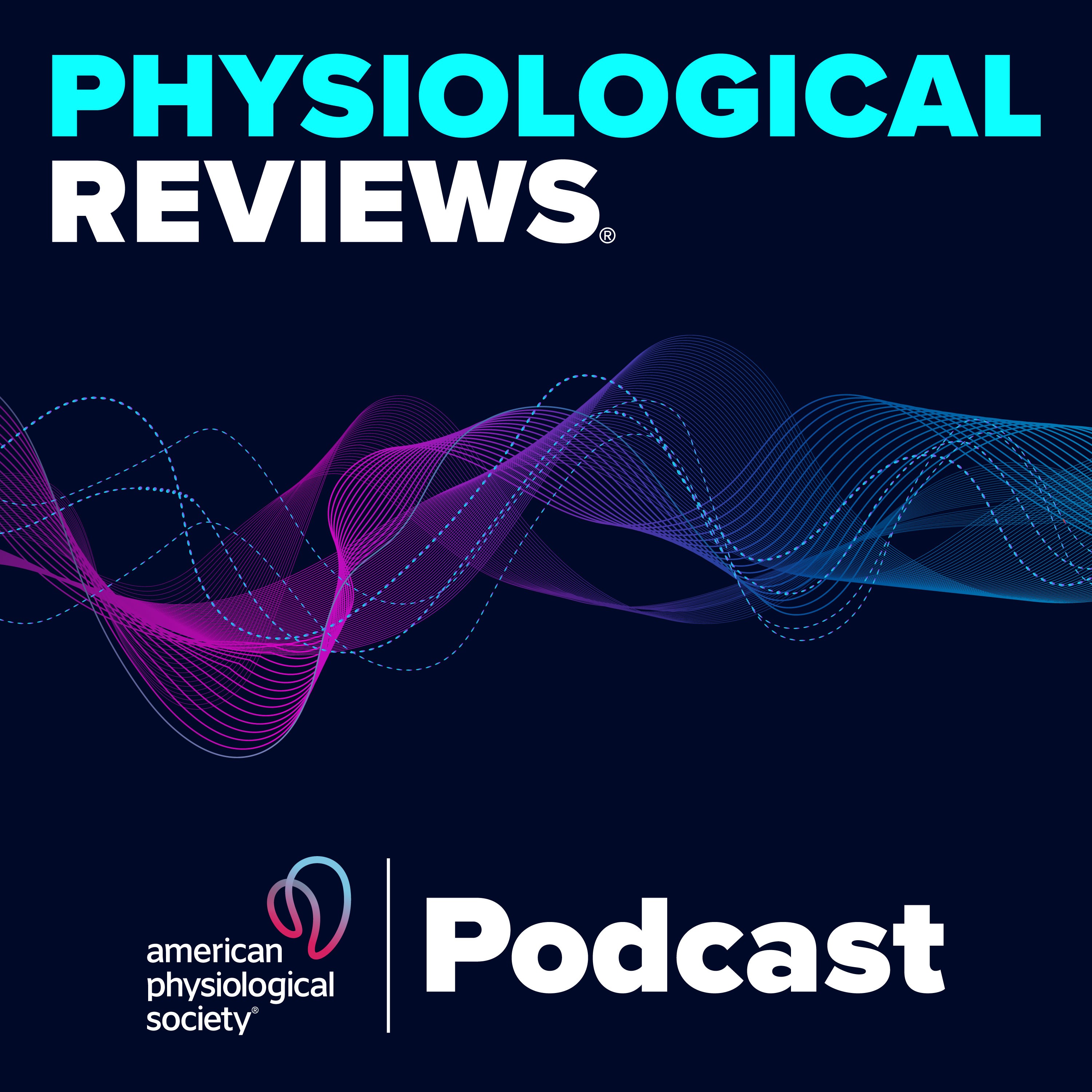
6.1K
Downloads
28
Episodes
Each episode of the Physiological Reviews podcast features commentary and discussion of newly published articles in the journal, which provides state-of-the-art, comprehensive, and high-impact coverage of timely issues in the physiological and biomedical sciences. Physiological Reviews articles appeal to physiologists, neuroscientists, cell biologists, biophysicists, and clinicians with special interest in pathophysiology. The journal is very useful in teaching and research because it provides non-biased and clearly written updates on important developments.
Episodes
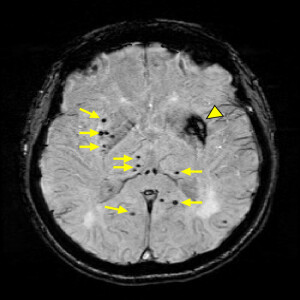
Wednesday May 21, 2025
Cerebral Small Vessel Disease
Wednesday May 21, 2025
Wednesday May 21, 2025
What is cerebral small vessel disease and why is it such a critical area of research? In this episode, Associate Editor Dr. Scott Earley (University of Rochester) interviews author Dr. Anne Joutel (Université Paris Cité, Institute of Psychiatry and Neuroscience of Paris, INSERM) about the pathogenic diagnosis and molecular basis of cerebral small vessel disease (cSVD). Classified into two categories, cerebral amyloid angiopathy (CAA) and nonamyloid cSVD, cSVD is a major health problem responsible for about 25% of ischemic strokes, the vast majority of spontaneous intracerebral hemorrhage, and about 20% of all dementia cases. What role does the presence of lesions in small vessels play in exacerbating the burden of neurodegenerative diseases such as Alzheimer’s Disease? What is “silent cSVD” and how common is it? Listen now to find out more.
Hugh S. Markus and Anne Joutel The pathogenesis of cerebral small vessel disease and vascular cognitive impairment Physiological Reviews, published February 18, 2025. DOI: 10.1152/physrev.00028.2024

Tuesday May 20, 2025
The Calculating Brain
Tuesday May 20, 2025
Tuesday May 20, 2025
In this episode, Dr. Jan Born (University of Tübingen) interviews his colleague and author Dr. Andreas Nieder (University of Tübingen) about his recent Review in Physiological Reviews on mathematical reasoning that incorporates neurobiology, comparative physiology, and neurophysiology. Mathematical skills can be described as falling into symbolic (arithmetic, number theory) and non-symbolic (set size) representations of numerical quantities. Infants as young as 2 days old can discriminate set size, for example, distinguishing between four dots and eight dots. And then, of course, there is the fascinating concept of zero, which is “rather like the eccentric uncle in the series of numbers,” as Dr. Nieder says. Understanding the concept of zero as the absence of something, represented as a number, is critical to understanding all other numbers. How does all of this work in the brain? Listen and find out.
Andreas Nieder The calculating brain Physiological Reviews, published October 25, 2024. DOI: 10.1152/physrev.00014.2024
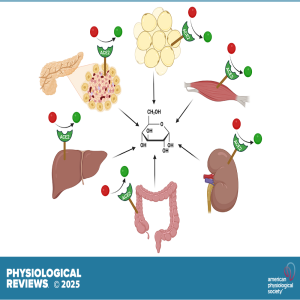
Tuesday Apr 22, 2025
Molecular Dissection of the Role of ACE2 in Glucose Homeostasis
Tuesday Apr 22, 2025
Tuesday Apr 22, 2025
In the episode, Dr. Willis K. “Rick” Samson (Saint Louis University School of Medicine) interviews lead author Dr. Eric Lazartigues (Louisiana State University Health Sciences Center) about the recent Review by Chhabra et al. on the latest discoveries related to the role of ACE2 in glucose homeostasis and regulation of metabolism. What are the consequences, in terms of pancreatic function and glucose homeostasis, for ACE2 knockout animals compared to animals used in overexpression studies? Listen as we discuss skeletal muscle effects related to changes in body weight, effects on intestinal absorption and the microbiome, as well as potential clinical applications of ACE2 therapies. What advice does Dr. Lazartigues offer to early career researchers about how to pursue their good ideas? Listen to find out.
Kavaljit H. Chhabra, Robin Shoemaker, Chandana B. Herath, Merlin C. Thomas, Catalin M. Filipeanu, and Eric Lazartigues Molecular Dissection of the Role of ACE2 in Glucose Homeostasis Physiological Reviews, published February 7, 2025. DOI: 10.1152/physrev.00027.2024
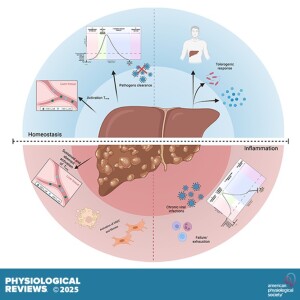
Friday Feb 28, 2025
The Liver as a Central Hub of the Immune System
Friday Feb 28, 2025
Friday Feb 28, 2025
In the episode, Dr. Mark Donowitz (Johns Hopkins School of Medicine) interviews Dr. Pietro Invernizzi (IRCCS Fondazione San Gerardo dei Tintori; University of Milano-Bicocca) and Dr. Vincenzo Ronca (University of Birmingham; Humanitas University) about their recent Review article that describes the immune function of the liver. Listen as these experts discuss immune tolerance in the liver, sex differences related to this immune tolerance, as well as new technological developments applied to the current understanding of immunology in the liver. This engaging conversation offers insights into both autoimmune liver diseases and non-autoimmune liver diseases, and glances toward the future for the “next big thing” advancing the field. To find out more, listen now.
Vincenzo Ronca, Alessio Gerussi, Paul Collins, Alessandro Parente, Ye Htun Oo, and Pietro Invernizzi The liver as a central “hub” of the immune system: pathophysiological implications Physiological Reviews, published January 15, 2025. DOI: 10.1152/physrev.00004.2023
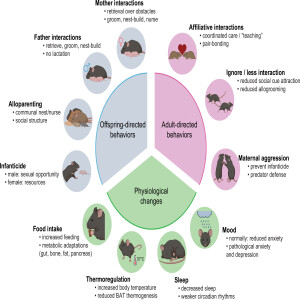
Thursday Dec 05, 2024
Neurobiology of Parenting and Infant-Evoked Aggression
Thursday Dec 05, 2024
Thursday Dec 05, 2024
In the episode, Dr. Sadis Matalon (University of Alabama Birmingham) interviews Dr. Catherine Dulac (Howard Hughes Medical Institute, Center for Brain Science, Harvard University) about the new Review in Physiological Reviews by Kaplan et al., which explores the neural basis of the complex social behavior of parenting. Parenting behavior is absolutely essential for the development of human beings and animal species. All humans and animals will experience the impact of parenting behavior on their lives, and parenting behavior is far more complex than simply the care of others. Parenting behavior is a unique physiological state that affects infant-to-adult interactions and adult-to-adult interactions, as well as a wide range of physiological changes related to food intake, sleep, and mood. We discuss essential questions related to the prevalence of postpartum depression disorder, genetic and environmental factors affecting the control of parenting behavior, and whether parenting behavior can improve over time with experience. Listen to this fascinating conversation to learn more.
Harris S. Kaplan, Patricia M. Horvath, Mohammed Mostafizur Rahman, and Catherine Dulac The neurobiology of parenting and infant-evoked aggression Physiological Reviews, published October 25, 2024. DOI: doi.org/10.1152/physrev.00036.2023
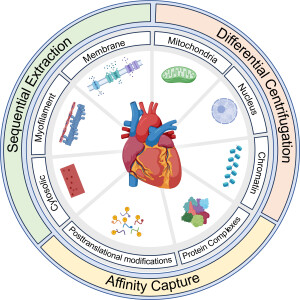
Thursday Nov 21, 2024
Proteomics of the Heart
Thursday Nov 21, 2024
Thursday Nov 21, 2024
In the episode, Dr. Carol Ann Remme (University of Amsterdam) and Dr. Sadis Matalon (University of Alabama Birmingham) interview Dr. Jenny Van Eyk (Cedars-Sinai) about the Review in Physiological Reviews by Karpov et al. that dives into proteomics of the heart. Given that proteins are the building blocks of life, studying only genetic data or RNAseq data may offer researchers a somewhat narrow view. Proteomics looks broader, and broader is better, according to Dr. Van Eyk. However, this means that rigor at the proteomic technology level is critically important. Because the field of proteomics offers many different tools, using proteomics to study the heart necessitates matching the research question to the right tool. Dr. Van Eyk encourages researchers to develop a well-defined research question and then match it to the proteomics technology that is most appropriate, so that the output is as useful as possible. Pushing research to new frontiers allows researchers to find discoveries they never expected. Listen now and learn more.
Oleg A. Karpov, Aleksandr Stotland, Koen Raedschelders, Blandine Chazarin, Lizhuo Ai, Christopher I. Murray, Jennifer E. Van Eyk Proteomics of the Heart Physiological Reviews, published April 9, 2024. DOI: doi.org/10.1152/physrev.00026.2023
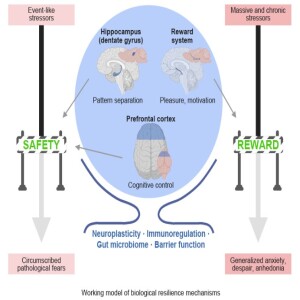
Monday Nov 04, 2024
Neurobiology and Systems Biology of Stress Resilience
Monday Nov 04, 2024
Monday Nov 04, 2024
What are the biological, neural, and psychological mechanisms of resilience to trauma, stress, and adversity? In this episode, Dr. Jan Born (University of Tübingen) interviews Dr. Raffael Kalisch (Leibniz Institute for Resilience Research) about the open access Review in Physiological Reviews by Kalisch et al. By unraveling the protective mechanisms of stress resilience, the authors hope to find new and better ways to improve therapies for stress-related disorders such as anxiety, depression, and post-traumatic stress disorder. Is there a unifying theory of stress resilience? Listen to this engaging conversation to find out.
Raffael Kalisch, Scott J. Russo, and Marianne B. Müller Neurobiology and systems biology of stress resilience Physiological Reviews, published May 15, 2024. DOI: 10.1152/physrev.00042.2023
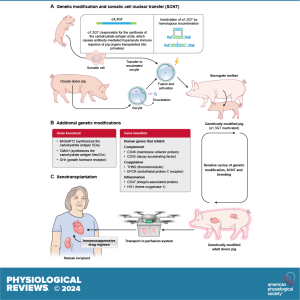
Monday Jun 17, 2024
Xenotransplantation from Genetically Modified Pigs to Humans
Monday Jun 17, 2024
Monday Jun 17, 2024
In our latest episode, Physiological Reviews Editor-in-Chief Dr. Sadis Matalon (University of Alabama at Birmingham) interviews authors Dr. Leigh Peterson (Executive Vice President for Product Development and Xenotransplantation at United Therapeutics Corporation) and Professor Sir Magdi Yacoub (Professor of Cardiothoracic Surgery at the National Heart and Lung Institute at Imperial College London, and Founder and Director of Research at the Harefield Heart Science Centre and Aswan Heart Centre). The authors have published a comprehensive review on xenotransplantation. Listen as they discuss the steps necessary to immunologically modify pigs to avoid acute rejection and minimize chronic rejection, as well as the main differences between the GalSafe and the 10GE pigs described in the article. Given that the American Physiological Society launched their Women’s Health Research Initiative in spring 2024, we discuss how xenotransplantation and women’s health research are connected. What are the next important developments in this field? Listen to find out more.
Leigh Peterson, Magdi Yacoub, David Ayares, Kazuhiko Yamada ,Daniel Eisenson, Bartley P. Griffith, Muhammad Mohiuddin, Will Eyestone, J. Craig Venter, Ryszard T. Smolenski, and Martine Rothblatt Physiological Basis for Xenotransplantation from Genetically-Modified Pigs to Humans: A Review Physiological Reviews, published June 7, 2024. DOI: 10.1152/physrev.00041.2023
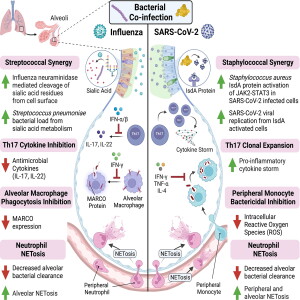
Thursday Apr 25, 2024
Community-Acquired Bacterial Coinfections and COVID-19
Thursday Apr 25, 2024
Thursday Apr 25, 2024
In our latest episode, Dr. Farrah Kheradmand (Baylor College of Medicine) interviews Dr. Kevin Harrod (University of Alabama at Birmingham) about his article by Patton et al. on community-acquired bacterial coinfections and COVID-19. In the early days of the pandemic when physicians were treating critically ill COVID patients, there was no standard definition for bacterial coinfections in this cohort. However, as the field has moved forward with understanding how bacterial coinfections contribute to the mortality of COVID patients, Dr. Harrod and co-authors have worked to refine the definition of bacterial coinfections to provide a more unified way to report the prevalence of this important clinical problem. While it is often necessary to treat critically ill hospitalized COVID patients with antibiotics before sampling or culture results, Dr. Harrod and co-authors identify that this may mask the true prevalence of bacterial coinfections. Listen as Dr. Kheradmand and Dr. Harrod discuss linkages between carriage, viral infection, and secondary bacterial infections, as well as the pathophysiological ways that fungi may coinfect COVID patients. Are patients with underlying cystic fibrosis more prone to COVID infection? Listen now to learn more.
Michael John Patton, Amit Gaggar, Matthew Might, Nathaniel Erdmann, Carlos J. Orihuela, and Kevin S. Harrod Community-acquired bacterial coinfections and COVID-19 Physiological Reviews, published October 16, 2023. DOI: 10.1152/physrev.00010.2023
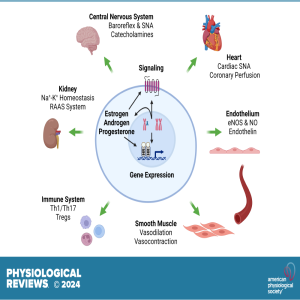
Thursday Apr 11, 2024
Sex Differences in Blood Pressure Regulation and Hypertension
Thursday Apr 11, 2024
Thursday Apr 11, 2024
The topic of hypertension is of paramount clinical importance as a significant risk factor for cardiovascular disease, myocardial infarction, stroke, and kidney disease. Sex differences in blood pressure regulation play a major role in the pathophysiology of hypertension. In the episode, Dr. Carol Ann Remme (University of Amsterdam) interviews Dr. Thu Le (University of Rochester) about her new Review in Physiological Reviews on the renal, hemodynamic, and hormonal mechanisms of sexual dimorphism in blood pressure homeostasis. We discuss sex chromosome effects, hormonal changes, potential sex differences related to innate and adaptive immunity, and the clinical relevance of animal models to develop new therapeutic targets. Listen now and learn more.
Erika R. Drury, Jing Wu, Joseph C. Gigliotti, Thu H. Le Sex differences in blood pressure regulation and hypertension: renal, hemodynamic, and hormonal mechanisms Physiological Reviews, published October 16, 2023. DOI: 10.1152/physrev.00041.2022
